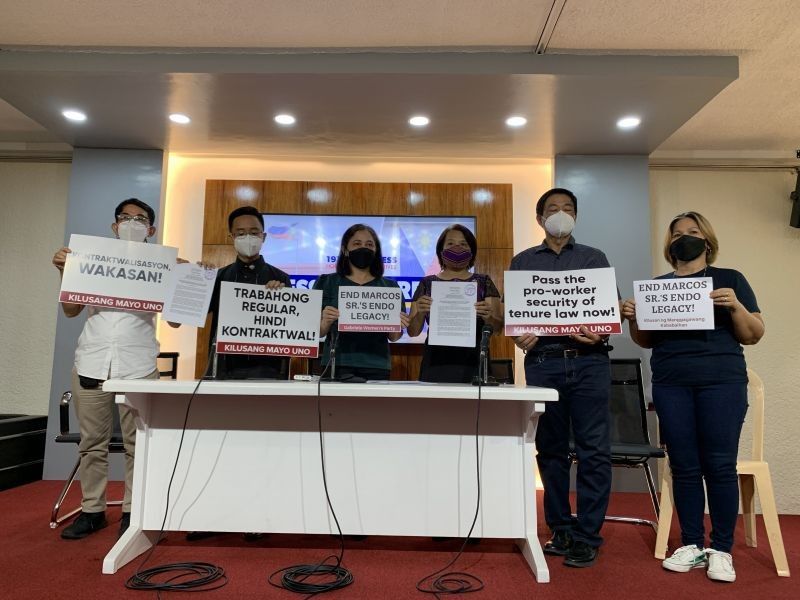House bill seeks ban on all forms of contractualization

MANILA, Philippines — The progressive Makabayan bloc in the House of Representatives filed Wednesday a “pro-worker” bill that seeks to end all forms of contractual arrangements, which they said violate laborers’ constitutional right to security of tenure.
House Bill 2173 seeks to ban all kinds of contractualization, fixed-term employment, job contracting and the direct hiring of contractual workers which the proposal classifies as unfair labor practices.
The measure says that there is contractualization “whenever an employer enters into a contract with another person for the performance of the former’s work.”
This includes work to be performed within a definite or predetermined period that is farmed out to contractors, subcontractors, manpower agencies, workers’ cooperatives or other similar entities.
It also includes work that is contracted out by a person, partnership, association or corporation, or cooperative with a contractor, subcontractor, manpower agency or cooperative, or workers’ cooperative.
The measure provides that workers are regular employees when an employer contracts or subcontracts them for work that is “necessary or desirable” to the business or operations.
It states that the employer must prove that the work performed by laborers is not necessary or desirable to their business.
Fixed-term employment is also barred under the proposal, except in cases of overseas Filipino workers, relievers who are temporary replacements of absent regular employees whose engagements shall not exceed one week, project and seasonal employees.
Project and seasonal employees, however, are still considered regular employees under the measure.
The bill defines project employment as “an existing project or undertaking the nature of which is temporary and the completion or termination has been determined and made known to the employee at the time of the engagement.”
Seasonal employment, meanwhile, is based on the existence of a season and shall only be applicable in agricultural work.
Stiffer penalties
The proposed law also seeks to amend Article 294 of the Labor Code to bar the dismissal of any employee without just cause or due process and to ensure that a regular employee who is unjustly dismissed will be immediately reinstated with their privileges and benefits even pending appeal.
The amendment also provides that the illegally dismissed employee will be entitled to their full backwages, accrued benefits and remunerations provided by law, company policy and collective bargaining agreement.
Should reinstatement be no longer feasible either because the relationship between the employer and employee has been strained or the worker no longer wants it, the employer must give the dismissed laborer separation pay amounting to at least two months or two months’ salary for every year of service, whichever is higher.
The Makabayan bloc’s proposal also seeks to impose a heftier fine for employers who illegally terminate employees, making them liable to pay a fine of double the amount of the dismissed employees’ backwages.
Their measure also defines that an employer-employee relationship exists “when the worker is engaged to render work or service under the control or supervision of the employer, not only as to the end to be achieved, but also as to the manner, means and method in reaching the end.”
It adds that, “payment of remuneration, however denominated, to the worker also indicates the existence of employer-employee relationship.”
Violators of the proposed law will be fined P1 million to P10 million or jailed from six months to three years, or both, depending on the court.
Businesses who violate the proposal will have their business permit suspended for a month to three years on their first offense and canceled on their second offense. They must also indemnify contractual employees at least P75,000 each on top of other monetary awards they are entitled to.
Quest to end ‘endo’
Ending “endo” or the practice of contracting workers until before they are deemed regular employees so employers can skimp on paying them benefits has been a hot-button issue in the country, ever since former President Ferdinand Marcos Sr.’s Labor Code paved the way for this.
In 2019, Congress came close to abolishing endo through the security of tenure bill, which critics said was still a watered-down version of what should essentially be a pro-worker legislation.
However, then President Rodrigo Duterte, who promised on the 2016 campaign trail that he would end endo, vetoed the bill saying that its expansion of what types of contracting are prohibited “destroys the delicate balance and will place capital and management at an impossibly difficult predicament with adverse consequences to the Filipino workers in the long term.”
Congress was unable to override Duterte's veto, but the House in 2020 passed similar legislation. This, however, was not passed by the Senate.
President Ferdinand Marcos Jr. said on the campaign trail that he hopes to "amend, rewrite and fine-tune" the vetoed security of tenure bill and vowed to enact it into law "if the new version is good."
- Latest
- Trending

































